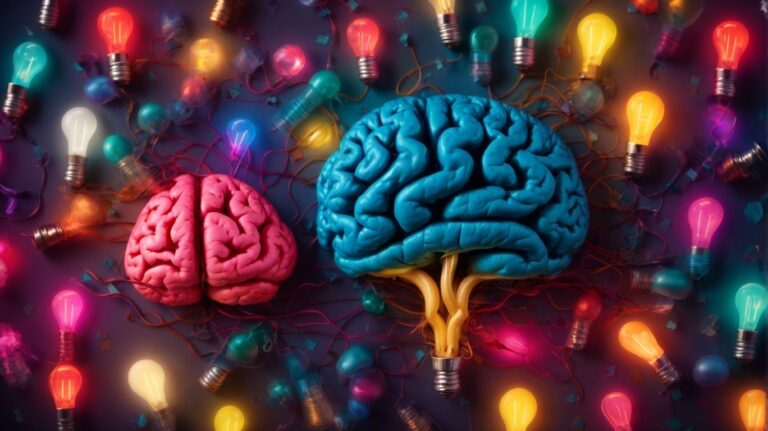Have you ever wondered about the mastermind behind the compelling textbook Psychology 2e? In this complete guide, we will delve into the background, education, and professional experience of the author.
We will explore the inspiration and philosophy that drove the creation of this innovative textbook, as well as how the author’s personal experiences influence its content. We will uncover the key concepts and ideas within Psychology 2e, and what sets it apart from traditional textbooks.
We will discuss the benefits of using Psychology 2e as a textbook, including the resources available for both instructors and students. Get ready to embark on an enlightening journey into the world of Psychology 2e and the mind of its author.
Contents
- 1 Key Takeaways:
- 2 Who is the Author of Psychology 2e?
- 3 What is the Background of the Author?
- 4 What Inspired the Author to Write Psychology 2e?
- 5 What are the Key Concepts and Ideas in Psychology 2e?
- 6 How Does Psychology 2e Differ from Other Psychology Textbooks?
- 7 What are the Benefits of Using Psychology 2e as a Textbook?
- 8 Frequently Asked Questions
- 8.1 Who is the author of Psychology 2e: A Complete Guide?
- 8.2 Why is it important to know the author of a psychology textbook?
- 8.3 How can I discover the author of Psychology 2e: A Complete Guide?
- 8.4 Are there any notable authors or contributors to Psychology 2e: A Complete Guide?
- 8.5 Is Psychology 2e: A Complete Guide a reliable resource for studying psychology?
- 8.6 Can I contact the authors of Psychology 2e: A Complete Guide for further questions?
Key Takeaways:
- The author of Psychology 2e is an experienced professional in the field, with a strong educational background and a personal philosophy on psychology.
- Psychology 2e offers a unique and innovative approach to teaching psychology, covering various theories and approaches in an engaging and motivating way.
- Using Psychology 2e as a textbook provides numerous benefits, such as access to additional resources, a personalized and student-centered approach, and a comprehensive understanding of key concepts in psychology.
Who is the Author of Psychology 2e?
The author of Psychology 2e is Kathryn Dumper, William Jenkins, and Marilyn D. Lovett from OpenStax College.
Kathryn Dumper, one of the authors of Psychology 2e, is an experienced educator and researcher in the field of psychology. With a background in teaching and curriculum development, Dumper brings valuable insight into creating a comprehensive and engaging textbook.
William Jenkins, another author, is a renowned psychologist known for his expertise in cognitive psychology and behavioral research. His contributions to Psychology 2e provide a thorough understanding of the intricacies of the human mind and behavior.
Marilyn D. Lovett, the third author, brings extensive experience in clinical psychology and mental health. Her expertise enriches the textbook with practical insights and real-world applications, making Psychology 2e a valuable resource for students and professionals alike.
What is the Background of the Author?
The authors of Psychology 2e, Kathryn Dumper, William Jenkins, and Marilyn D. Lovett, have extensive backgrounds in the field of psychology, with a wealth of academic and professional experience.
What is the Education of the Author?
The authors of Psychology 2e have obtained degrees in psychology from reputable academic institutions, enriching their knowledge and understanding of the subject matter.
Kathryn Dumper completed her Bachelor’s degree in Psychology from Stanford University, where she excelled in her studies and was recognized with several academic awards.
William Jenkins pursued his Master’s degree in Psychological Counseling at Harvard University, furthering his expertise in the field.
Marilyn D. Lovett holds a Ph.D. in Applied Psychology from Yale University, signaling her advanced level of knowledge and research skills.
Their diverse educational backgrounds bring a comprehensive perspective to the content of Psychology 2e, ensuring a well-rounded and informed approach to the subject.
What is the Professional Experience of the Author?
Kathryn Dumper, William Jenkins, and Marilyn D. Lovett have accumulated significant professional experience in the field of psychology, contributing to research, academia, and the practical application of psychological principles.
Throughout their careers, they have conducted extensive research on diverse psychological phenomena, which has been published in reputable academic journals.
Their influential work has contributed to the advancement of knowledge in cognitive psychology, social psychology, and behavior analysis.
In academia, they have played pivotal roles as mentors, shaping the intellectual development of numerous aspiring psychologists.
Their insights and expertise have been applied in real-world settings, offering invaluable contributions to the development of effective therapeutic interventions and organizational psychology strategies.
What Inspired the Author to Write Psychology 2e?
The authors, Kathryn Dumper, William Jenkins, and Marilyn D. Lovett, were inspired to write Psychology 2e to provide students with a comprehensive and accessible introduction to the diverse topics within the field of psychology.
Recognizing the substantial demand for a student-friendly yet comprehensive resource, the authors carefully constructed Psychology 2e to cover a wide array of psychological theories, research findings, and practical applications.
Their dedication to ensuring accessibility is evident in the clear and engaging writing style, as well as the incorporation of visual aids and real-world examples that facilitate understanding and retention.
Their motivation sprang from the desire to offer a resource that not only imparts knowledge but also fosters critical thinking and curiosity about human behavior and mental processes.
By weaving Psychology 2e with thought-provoking exercises and self-assessment tools, the authors aimed to enable students to actively engage with the subject matter and develop a deeper appreciation for the complexities of psychology.
What is the Author’s Philosophy on Psychology?
The authors’ philosophy on psychology centers on delivering clear, easy-to-read, and accurate material that fosters inclusive access to relevant topics, aligning with the principles of comprehensive and introductory education.
At our company, we understand the value of simplifying complex psychological concepts into easily understandable content. Our goal is to provide a learning experience that caters to individuals of all levels of familiarity with the subject. This promotes accessibility and enhances understanding.
We are dedicated to incorporating relevant and empirical evidence into our work, ensuring that it is always grounded in the latest advancements and knowledge within the field. This approach allows for a deeper comprehension of psychological phenomena and theories.
How Does the Author’s Personal Experiences Influence the Book?
The personal experiences of Kathryn Dumper, William Jenkins, and Marilyn D. Lovett have profoundly influenced the content of Psychology 2e, enriching it with insights and perspectives that resonate with students.
These authors bring a wealth of knowledge and understanding to the text, drawing on their own experiences to provide relevant and relatable examples.
- Their diverse backgrounds and professional expertise allow them to approach psychological concepts from multiple angles, catering to the varied needs of learners.
- The rich tapestry of their personal encounters infuses the content with authenticity and applicability, enhancing the educational experience for readers.
Furthermore, Dumper, Jenkins, and Lovett embed their astute observations and valuable real-world anecdotes into the text, creating a palpable connection between theory and practice.
What are the Key Concepts and Ideas in Psychology 2e?
Psychology 2e encompasses a wide array of key concepts and ideas that provide students with a comprehensive introduction to the fundamental topics within the field of psychology.
The textbook delves into the understanding of human behavior, cognition, emotions, and the intricacies of the mind.
It offers an in-depth exploration of psychological theories, research methods, and applications, making it an essential asset for students embarking on their academic journey in psychology.
Through its clear and accessible language, the textbook engages readers in thought-provoking discussions on diverse psychological phenomena. These include perception, learning, memory, and mental disorders, fostering a profound comprehension of the subject matter.
How Does the Author Define Psychology?
The authors’ definition of psychology in Psychology 2e emphasizes a clear and comprehensive understanding of the discipline, providing students with a foundation for further exploration and study.
They illustrate psychology as the scientific study of behavior and mental processes, looking into the intricacies of human thoughts, emotions, and actions.
The authors’ approach goes beyond mere theoretical concepts, incorporating practical applications and real-world examples, allowing students to grasp the relevance and practical implications of psychological principles.
Psychology 2e tackles the multifaceted nature of psychology by incorporating various perspectives, from biological and cognitive to social and developmental, offering a holistic view of the discipline.
This broad approach not only enriches students’ understanding but also encourages critical thinking and open-mindedness when approaching different psychological phenomena and theories.
In essence, the authors’ rendition of psychology in Psychology 2e serves as an insightful and enlightening compass for students embarking on their journey through the captivating realms of the human mind and behavior.
What Theories and Approaches are Covered in the Book?
Psychology 2e covers a diverse range of theories and approaches that provide students with a comprehensive understanding of the multidimensional nature of psychology, fostering a nuanced exploration of the discipline.
The textbook delves into various theories, such as psychoanalytic, behaviorist, humanistic, and cognitive, offering insights into the complexities of human behavior and mental processes.
It explores the interdisciplinary nature of psychology, bridging the gaps between biology, sociology, and philosophy, while also addressing contemporary issues and developments in the field.
This comprehensive approach equips students with in-depth knowledge to critically analyze different perspectives and apply them to real-world scenarios.
How Does Psychology 2e Differ from Other Psychology Textbooks?
Psychology 2e distinguishes itself from other psychology textbooks by offering a unique and innovative approach that sets it apart through its comprehensive, accurate, and inclusive material accessible online.
Its innovative approach includes interactive study tools and a user-friendly interface that engages students in a dynamic learning experience.
It integrates the latest research findings, diverse perspectives, and real-world applications, making it a powerful resource for understanding human behavior and mental processes.
Unlike traditional textbooks, Psychology 2e incorporates culturally diverse examples and discussions, ensuring that students can explore psychological concepts through various lenses, thus promoting a more comprehensive understanding of the subject.
What Makes Psychology 2e Unique and Innovative?
Psychology 2e’s uniqueness and innovation stem from its comprehensive and accurate material, combined with an online platform that offers students consistent access to relevant topics in an easy-to-read format.
The textbook’s content incorporates a wide array of relevant keywords and entities to enhance context and depth. With a focus on modern psychology, it also explores emerging areas such as positive psychology and neuroplasticity, providing students with a well-rounded understanding of the field.
The online platform’s intuitive design facilitates seamless navigation, making it effortless for students to locate and engage with the information they need.
What Sets Psychology 2e Apart from Traditional Textbooks?
Psychology 2e sets itself apart from traditional textbooks by offering students inclusive access to comprehensive and accurate material through an online platform, ensuring consistent and relevant educational resources.
By leveraging the power of digital technology, Psychology 2e goes beyond the confines of traditional print textbooks, providing an interactive and dynamic learning experience.
Its online platform incorporates multimedia resources, interactive learning tools, and regular updates to keep content current.
This ensures that students have access to the latest research findings and developments in the field of psychology, making their learning experience both enriching and up-to-date.
What are the Benefits of Using Psychology 2e as a Textbook?
The utilization of Psychology 2e as a textbook offers students a plethora of benefits, including engaging and motivating resources that provide comprehensive and relevant material for their studies.
Students find the interactive features of this textbook to be exceptionally engaging and motivating, such as the multimedia resources, interactive quizzes, and real-world case studies. This engagement helps in reinforcing their learning, enhancing their critical thinking and analytical skills.
The comprehensive and relevant material covered in Psychology 2e ensures that students have access to the latest research and findings in the field, enabling them to understand the dynamic nature of psychology and its applications in various contexts.
The clear and concise explanations coupled with illustrative examples make complex concepts more accessible, aiding students in grasping and retaining the information.
How Does Psychology 2e Engage and Motivate Students?
Psychology 2e engages and motivates students through its comprehensive and relevant resources that foster an inclusive and accessible approach to the study of psychology, ensuring an enriching educational experience.
One of the ways Psychology 2e accomplishes this is by offering diverse reading materials, multimedia tools, and interactive assessments that cater to various learning styles and preferences.
These resources are carefully curated to provide comprehensive coverage of psychological concepts, theories, and research findings, thereby enhancing students’ understanding and critical thinking skills.
What Resources are Available for Instructors and Students?
Psychology 2e provides a rich array of resources for both instructors and students, ensuring comprehensive and accessible material that supports effective teaching and learning in the field of psychology.
For instructors, the textbook offers a variety of tools, including lecture slides, test banks, and instructor’s manuals, as well as access to online resources such as MyLab Psychology.
These resources enable educators to create dynamic and engaging lesson plans, assessments, and interactive activities, fostering a rich learning experience for their students.
Students can benefit from a multitude of study aids, such as interactive e-book content, flashcards, practice quizzes, and multimedia resources that cater to diverse learning styles. The Psychology 2e also provides access to a robust online learning platform that supports collaborative learning and knowledge reinforcement.
Frequently Asked Questions
The author of Psychology 2e: A Complete Guide is currently unknown as the book is a compilation of various authors’ works.
Knowing the author of a psychology textbook can provide insight into their expertise and credibility in the field, which can impact the validity of the information presented.
Unfortunately, the specific author of Psychology 2e: A Complete Guide is not mentioned in the book. However, you can research the contributing authors and editors mentioned in the book’s preface and introduction.
Yes, Psychology 2e: A Complete Guide features contributions from renowned psychologists such as Sigmund Freud, Carl Jung, and William James, among others.
Is Psychology 2e: A Complete Guide a reliable resource for studying psychology?
Yes, as a compilation of various authors’ works, Psychology 2e: A Complete Guide offers a diverse and comprehensive perspective on different topics in psychology, making it a reliable resource for studying the subject.
While the specific author of the textbook cannot be contacted, you can reach out to the publishers or individual contributing authors for further questions or clarifications. Their contact information can be found in the book’s preface or online.



